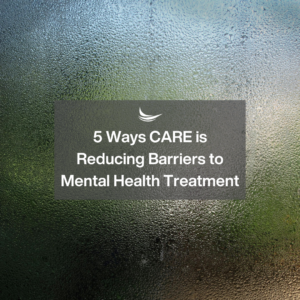5 Ways CARE is Reducing Barriers to Mental Health Treatment
 Did you know that in 2022, CARE Counseling supported over 15,000 individuals and families and in 2023 therapists held 175,196 appointments? That is a lot of people helped! CARE’s mission is “building a community to strengthen the community,” with decisions filtering through this lens, including initiatives to remove barriers for BIPOC students and developing of team of highly trained therapists to help meet the needs of the community.
Did you know that in 2022, CARE Counseling supported over 15,000 individuals and families and in 2023 therapists held 175,196 appointments? That is a lot of people helped! CARE’s mission is “building a community to strengthen the community,” with decisions filtering through this lens, including initiatives to remove barriers for BIPOC students and developing of team of highly trained therapists to help meet the needs of the community.
The availability of White therapists is more than 3Xs the availability of BIPOC therapists in the United States. CARE More is a non-profit agency created by CARE Counseling in response to the shortage of BIPOC students pursuing master’s or doctoral degrees as only 1.8% of clinicians in Minnesota were BIPOC. By working to remove barriers for students, we are working to remove barriers for clients.
As I have partnered with community organizations and assisted individuals connecting to mental health therapists, some of the biggest barriers included finding a provider who fits multiple criteria such as the following: preferences for provider match, accessibility (including access to interpreters and bilingual therapists), availability, and insurance barriers. I spent a lot of my professional career doing community-based mental health in St. Paul’s Frogtown/ Thomas-Dale neighborhood where over 73% of the population was BIPOC. Even if all these criteria for a therapist were met, there was no guarantee of the quality of care due to variability in training, supervision, and workplace support.
I am so excited to see the impact of high-quality training, supervision, and APA-approved continuing education for CARE therapists on diversity to promote developing cultural competencies. Our clinicians are committed to practicing cultural humility and engaging in culturally responsive approaches as well as ethically minded practices. We have also expanded our services to provide medication management to current clients, provide specific testing services, and share our expertise by offering community presentations.
Here are five ways the CARE has been actively taking steps to remove barriers:
Support in Finding a Provider Match
At CARE Counseling we are proud of our talented, diverse team including clinicians who identify as Black, Indigenous, and Persons of Color (BIPOC). While services are provided in English, several therapists are comfortable providing therapy in other languages including Spanish, Chinese, Vietnamese, and Igbo. Clients need to find a therapist that they trust, and working with a provider who shares similar experiences or identities can help reduce fear and mistrust within therapy as well as provide a sense of emotional safety when exploring topics such as systemic racism, discrimination, microaggressions, acculturation, identity, cultural values, trauma, and internalized beliefs. Our therapists come from all walks of life, with various interests, specialties, and theoretical approaches. With a team of over 250 clinicians, we can help you find a good match for your needs.
Multidisciplinary Treatment Team
Our treatment team is multidisciplinary, meaning that there are providers of multiple training pathways within the mental health field or psychology. Our amazing team of therapists includes clinical trainees, pre-independently licensed therapists (working under supervision), and licensed therapists including licensed independent clinical social workers (LICSW), licensed marriage and family therapists (LMFT), and licensed professional clinical counselors (LPCC) as well as predoctoral therapists, licensed psychologists (LP). By working together, we can assist with providing additional referrals and resources, if needed as well as coordinate care.
Accessibility of In-Person and Telehealth Therapy
At CARE Counseling we are working hard to reduce barriers and are proud to offer both in-person and telehealth therapy to clients within our ten locations. By offering telehealth, we can increase access to clients within the entire state of Minnesota. By offering in-person sessions in Minneapolis accessible on the bus line and expanding to the suburbs and rural Minnesota at our Mankato offices, more clients can be helped.
Same-Week Availability
Are you tired of calling around for an outpatient therapist, only to find that there is a long waitlist? At CARE Counseling, we have a team of therapists with same-week availability to get you the support you need, when you need it.
In-network with All Major Insurance
CARE Counseling is in network with all major insurance, including Medical Assistance which increases access to specialized treatment approaches to all clients.
Written By: Charlotte Johnson, MA, LPCC



























